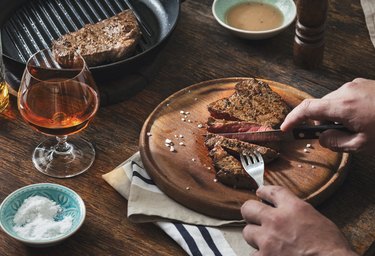
You push away from the dinner table feeling incredibly uncomfortable and unbutton your pants. If this scenario sounds familiar, it may be time to look at the types of foods you're eating to identify what's causing you to feel so bloated.
Bloating can stem from a number of issues like eating too much fiber, constipation, gut sensitivity, irritable bowel syndrome (IBS) or eating foods high in FODMAPs (fermentable oligosaccharides, disaccharides, monosaccharides and polyols), as outlined by Johns Hopkins Medicine.
Video of the Day
Video of the Day
So while nights are for relaxing, and eventually getting a good night's sleep, these plans may be thwarted if you're experiencing abdominal discomfort. Here are some likely dinner foods that can cause you to feel bloated after eating.
1. Meatloaf or Pot Roast With Gravy
Meatloaf with gravy is a classic comfort dish that, unfortunately, can leave you feeling rather uncomfortable.
Why? Meatloaf and pot roast are typically made with fattier ground beef — like 80 or 85 percent lean — to keep the loaf from drying out. The roast can be an unhealthier cut of meat with visible fat within the meat and about 50 percent of total calories coming from fat.
And what are either of these dishes without a side of mashed potatoes and gravy? These rich and fatty foods can actually work against you when it comes to your digestion.
The trouble with these fatty meats is that they slow digestion. Meals with more fat tend to result in more symptoms of feeling full and bloated, and in some cases, nausea, an April 2016 review in Advanced Biomedical Research found.
To top it off (literally), gravy is typically higher in sodium, and when we consume salty foods, we retain more water, adding to the bloat.
2. Chili
There's nothing like ending a long day with a comforting bowl of chili, but this dish can leave you feeling gassy and bloated instead.
We know beans and legumes are a good source of fiber but it's the type of fiber — alpha-galactosides, a type of oligosaccharide — that is the main cause, as explained in an April 2018 review in Critical Reviews in Food Science and Nutrition.
These types of fiber resist digestion so they end up being fermented further along in our GI tract, causing a build-up of gas, aka flatulence. The benefits of beans and legumes outweigh the gassy side effect but it is worth keeping in mind.
3. Cruciferous Vegetables
A side of veggies is commonplace at many dinner meals but your choice of vegetables could leave you feeling bloated and gassy.
Kale, broccoli, cabbage, cauliflower and Brussels sprouts are all cruciferous vegetables, which means they all contain raffinose, a complex carbohydrate that is fermented in our guts, resulting in increased gas production, according to Today's Dietitian.
If you are left feeling gassy, bloated and uncomfortable after eating cruciferous vegetables, know that it's very common and there are actions you can take.
Tip
To help reduce or prevent this feeling, start with smaller servings and gradually increase, stay hydrated and chew your food thoroughly.
4. Frozen Dinners
They're quick and easy when you're in a pinch, but they can cause you to feel rather bloated in your waistline because of their high sodium content.
This extra water doesn't help your bloating concerns but it's also not good for your heart, according to the American Heart Association.
If you like to keep frozen dinners on hand as a plan B for hectic days, a good rule of thumb is to look for options with fewer than 500 or 600 milligrams per serving — or opt for these best frozen meals under $8.
5. Sausage
This meal is a double-whammy because it's traditionally high in fat and high in sodium. The combination slows down your digestion (thanks to the high fat content) and causes you to retain water (blame the high sodium content).
One positive note for Kielbasa sausage: It's often paired with sauerkraut, a fermented cabbage that naturally contains probiotics, which are great for your gut.
Look for the unpasteurized, raw type — you'll find it in the refrigerated section — to reap the benefits of this good bacteria. (High heat, like with the pasteurization process, can kill off the good gut bugs.)
Gassy and Bloated?
- Johns Hopkins Medicine: "Bloating: Causes and Prevention Tips"
- Cattlemen’s Beef Board and National Cattlemen’s Beef Association: "Blade Chuck Roast"
- Advanced Biomedical Research: "Dietary Fat Intake and Functional Dyspepsia"
- Critical Reviews in Food Science and Nutrition: "Processing Methods for Reducing Alpha-galactosides in Pulses"
- Today's Dietitian: "CPE Monthly: Cruciferous Vegetables"
- American Heart Association: "Get the Scoop on Sodium and Salt"